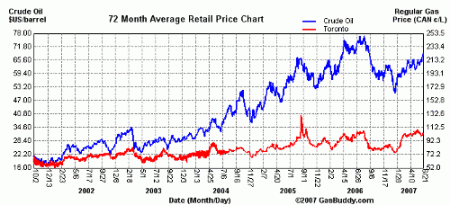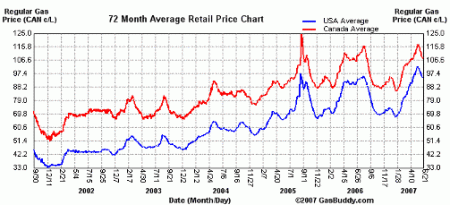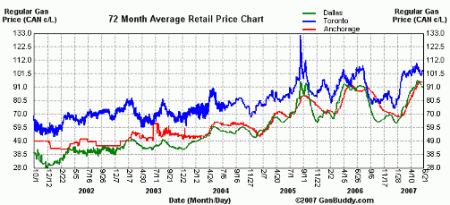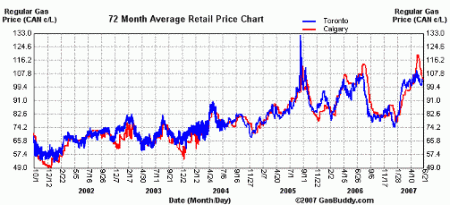If you’re not confused, you’re not paying attention.
~Tom Peters
Gasoline, petrol, essence, call it the way you want, we need it and we need it a lot. notwithstanding the widely known fact that I’m biking to work now, I still need the refined dinosaur bones to get to day care, supermarkets, and being summer, the beach. Every day we can see the price on the pumps going up and down, synchronized, in all the city of Toronto, and they have explain to us that no, that the four major gas retailers are not in concubinage to fleece us up, and that the high prices are just a reflect of demand, supply, crude oil prices, and of course, the overwhelming threat of terrorism since *sigh* 9/11.
Since the only threat I consider real is that aimed to my wallet, first I though nah! they are fleecing us up, then I realize that I cannot make an asseveration like that since everybody in the oil industry and in the government is telling us that high oil prices, problems in the supply chain, refinery cost, and *sigh* threat of terrorism since 9/11 are pushing this commodity’s price up and that the retailers are just as victims as us.
So I went to torontogasprices.com and made a small graph to see the correlation between oil and gas prices during the last six years.
I do not have the numeric data, so I cannot make a proper correlation, but, with the proper scale used (the increments in both Y-axis are similar), we can see that the price of gasoline is being every time a minor percentage of the oil price.
When in 2001 the Oil barrel was at 21 dlls, the litre of gas was at 60 cents, that is, given that the oil barrel has got 159 litres, a relation oil-litre/gas-litre of 13:60 or 21.66%, so for each dollar spent on gas, 21 cents went to paid for the oil. In 2007, we have got a price of 67 dlls per barrel (42 cts/lt) and 104 cts/lt of gas, so, the relation is now 42:104 or 40.38%, meaning that now, for every dollar of gas, we pay 40 cents of oil. So, the relation between oil and gas prices is a little foggy.
Then, let’s see about those problems in refinery and the supply chain. We can compare the prices between Canada and USA
They dance together! We do not need r ~ 1 to see that the prices are co-related. If we have refinery and distribution issues, are those affecting the entire continent? Both USA and Canada are heavy oil producers, so, the refinery and distribution within North America should affect only some areas, not the entire sub continent. Just for fun, let’s compare two oil producing cities in USA versus Toronto, a non-producer from Canada.
Looks like the relation is not that clear now. Looks like the price of gas not depend only on distribution or oil prices, since, although the price is mainly lower in the oil producing cities than Toronto, is not really always the case, and the price variation is less in Anchorage and Dallas than in Toronto.When we compare Toronto versus Calgary, another heavy producer, but in Canada, the difference is less, with Calgary having some times a higher price than Toronto.
What do we make of all these graphics? It is certain that there is not an issue about supply chain and distribution, and that the relation between oil and gas prices, while obviously existent, is not that strong as you may think between a raw material and a finished product, what makes sense, since the refinery process adds a lot of value.
The final explanation of why gas prices are so high would be demand and supply. The oil companies and the government keep telling us that a commodity is subject to full free market forces. Let’s see then how can we define a commodity:
1) A commodity is easily interchangeable, you can buy it from any supplier and the result is the same. This is partial true for gas, because we can buy it from any supplier, but there are not substitute products that we can use instead of gasoline.
2) A commodity is subject to free market rules. This is false in the case of gas, first, because we have a limit number of suppliers. In Canada we have Esso and Shell dominating the market, with Sunoco and Petro Canada filling up the gaps. This is not truly a perfect competition scenario. Second, no commodity is as regulated and taxed as gas, with federal and provincial taxes building up about 50% of the final price.
So we can conclude that gas price is not a commodity, that there is not apparent chain supply problem, and that, while the oil price is going up, the relation is not strong, giving also the fact that a lot of the value of the gasoline is added during refinery and do not come from its raw material.
In other words, they are fleecing us up.




Long time reader, first time poster. Funny enough I was doing some research on gas and oil prices and came upon this http://dhatz.blogspot.com/2006/06/oil-to-38657-per-barrel.html , a greek speculator wondering about the disparity between oil supply and the spot price of oil (wet barrels) and the futures contract on oil (paper barrels) and how the derivatives contract is more liquid and has more participants and is pushing the price up, while the suppliers are actually cutting down production because there is not enough demand.
Just trying to add a piece to the puzzle.
Saludos
Welcome to the postings Poncho! The derivative markets are tricky, you should expect them to predict the near future price of commodities, but then they go berserk and start reflecting a reality unknown by us. I will say that a lot of money is being made out of paper, but I cannot fully understand how it works, even that I took advanced finance in my MBA…
When did Gasoline begin to be traded on the US markets
Since it was included in the hedge markets, as well as oil and turbosine (for air planes). Companies can hedge against drastic changes in combustibles so they minimise uncertany
Good info. Lucky me I ran across your blog by chance (stumbleupon).
I’ve saved as a favorite for later!
Good article. I definitely love this site. Stick with
it!